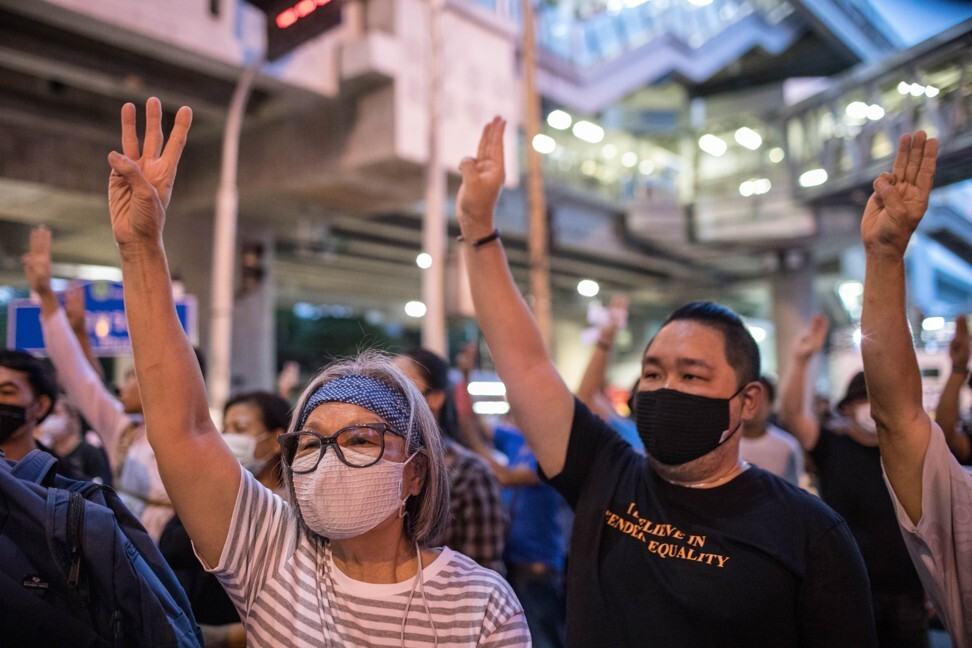
01:43
Thai protesters turn Bangkok street into catwalk to mock princess’s fashion show

The election of Joe Biden as US President has raised hopes in Thailand about a fresh approach on trade ties, with that optimism tempered by concerns that the government approach in dealing with the student-led anti-government protests could derail economic engagement.
Thailand’s economic relations with the US were set back when the Trump administration suspended its tariff-free privileges for exports under the Generalised System of Preferences (GSP), after the US Trade Representative cited Thailand’s blocking of US pork products and concerns of slave labour in the fisheries sector.
In all, the US suspended about US$2 billion in Thailand’s duty-free privileges over the past year, with US$817 million of that officially scheduled for revocation on December 30.
Ghanyapad Tantipipatpong, chairman of the Thai National Shippers’ Council, which represents Thai exporters, said businesses were hopeful that Biden “would take a friendlier stance towards Thailand on trade”, noting that “in the past years, we have made no progress in terms of free-trade agreements with either the European Union or the US”.
With falling exports and zero tourism due to the coronavirus pandemic leading to Thailand’s economy contracting by more than 7 per cent this year, the business sector is pinning its hopes on the new Democratic administration potentially joining the Comprehensive and Progressive Agreement for Trans-Pacific Partnership (CPTPP) and Thailand should take the earliest chance to join the pact, Ghanyapad said.
But noted political scientist Ian Bremmer is among analysts who say Biden will not be able to get the US back into the pact. “There’s no political capital, no support for it,” he told Bloomberg Television earlier this month.

01:43
Thai protesters turn Bangkok street into catwalk to mock princess’s fashion show
While economists expect increasing political tension from mostly youth-led protests to affect economic recovery, business leaders worry they could also have a detrimental effect on trade ties.
The government has so far not responded to the demonstrators’ demands – they are calling for the resignation of Prime Minister Prayuth Chan-ocha, a new constitution and reform of the revered monarchy – and has allowed the peaceful protests to continue, though the police did use water cannons to disperse crowds twice in the past month and have arrested several leaders of the movement.
Ties between the US and Thailand soured after Prayuth, the former army chief, took power in a 2014 coup, with Washington imposing a ban on sending military equipment and aid to the kingdom despite their decades-old security alliance.
While Prayuth retained power in Thailand’s general election last year, some criticised the election for not being fair.
Ghanyapad said the EU, for example, still has no plans to reach a free-trade agreement with Thailand. “Is this because the government is seen as not being democratic enough?” she asked.
Paul Chambers, a lecturer at Thailand’s Naresuan University’s Center of Asean Community Studies, said a Biden-led Democratic administration would likely stress human rights more than Trump and potentially “come down harder on Prayuth”.
“But Biden is a centrist,” Chambers added. “He would likely emphasise liberal values less so than did Obama before him. So I think there is a wriggle room for continuing close diplomatic relations between Biden and Prayuth.”
Termsak Chalermpalanupap, visiting fellow at the ISEAS – Yusof Ishak Institute in Singapore, said the kingdom had in recent years turned to Beijing mainly for arms deals and infrastructure projects, an area that “the US is not competitive in” in Thailand.

Last month, Thailand and China signed a delayed construction project for the US$1.6 billion, 253km high-speed railway from Bangkok to northern Thailand’s Nakhon Ratchasima, part of Beijing’s vision to connect Kunming in Southern China via Laos to Singapore as part of its Belt and Road Initiative.
While the US has not offered infrastructure cooperation, it is Thailand’s second-biggest trade partner behind China. In the first nine months of this year, Thailand-China trade was valued at US$58 billion, while trade with the US was worth US$37 billion. Thai exports to the US grew at a slightly faster pace than those to China, though – 7.4 per cent versus 3.7 per cent.
Ghanyapad, who also runs a company that exports canned fruits to the US and Europe, said a de-escalation in the US-China trade war would make the US market more competitive, with Chinese manufacturers increasingly seeking access to the US market. In turn, Thailand joining multilateral trade deals that include the US would help strengthen its export position.
Thailand is among the 15 nations set to sign the Regional Comprehensive Economic Partnership on Sunday, which will encompass 30 per cent of global economic output and trade.
Termsak said he believed the Biden administration would “better use its leverage over Thailand” to prevent Thailand from venturing “deeper into the Chinese camp”. A welcome gesture by the new administration would be to reinstall the GSP tariff privileges, he added.
“This will be a huge good gesture to win the hearts and minds of the Thais, especially the Thai media.”
Gregory Poling, senior fellow for Southeast Asia at the Center for Strategic and International Studies in Washington, said that while the Biden administration would not necessarily impose sanctions on the Prayuth government, “it will probably try to more clearly articulate that any new coup or serious democratic backsliding would place a limit on new security and economic cooperation”.
“Thailand is a US security ally, important economic partner, and the anchor of much of the United States’ diplomatic engagement in the region,” he said. “But the security alliance has become less important and more fragile over the years as Thailand does not share US worries about China, does not provide significant access in the way that Singapore does or the Philippines has, and everyone knows Thailand will not stand with the US in the case of a conflict with China.”
Poling said Thailand did not face an “either-or” choice between the US and China.
“It can have both freedom and prosperity, and both a strong relationship with the United States while maintaining strong economic ties to China. Much of the rest of the world manages to do all of those things at once.”